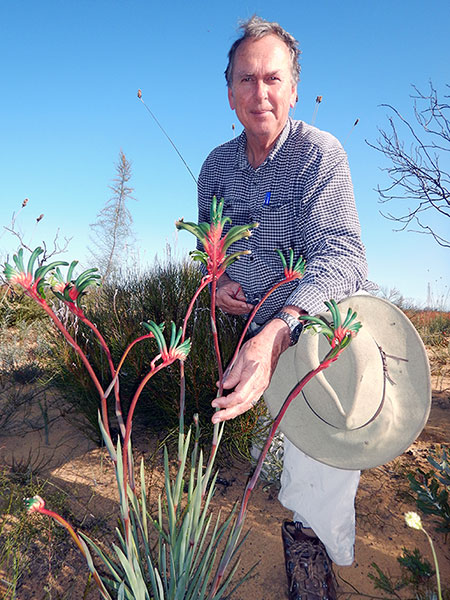UWA and me
I have been fortunate in working as WA’s first State government flora conservation researcher (1977-1992) and then as Director of two world-class botanic gardens - Perth’s Kings Park 1992-2004 and the Royal Botanic Gardens, Kew in London 2006-2012. In each of these roles I developed strong collaborations with UWA and other universities.
My introduction to UWA was as an undergraduate, awarded a BSc (Hons) majoring in Botany and Zoology in 1974, a PhD in evolutionary botany in 1980 and Hon DSc in conservation biology in 2010.
Prior to my present role, I served for two years as UWA’s Foundation Professor of Plant Conservation Biology (2004-2006) and as a member of the Board of UWA Press. Joining UWA’s Albany campus in 2012 with a joint appointment at CENRM and the then School of Plant Biology, I have now been able to fast track a senior academic career, including securing significant grants and a Discovery Outstanding Researcher Award from the Australian Research Council (ARC).
CENRM provides UWA with a regional biological and environmental research arm and contributes to field-based undergraduate learning in the heart of a global biodiversity hotspot. WA’s magnificent south coast provides me with exceptional opportunities to collaborate both with colleagues and students from a number of countries, and with local researchers, Aboriginal people, government, NGO’s and businesses to help devise new ways of living sustainably with biodiversity.
Why conservation biology?
Everywhere, in all cultures, inspiration from nature is vital. Experiences with biodiversity offer the incomparable excitement of discovery, spiritual enhancement and uplifting learning. Why is conservation so important?
Our own species probably evolved in small coastal South African populations escaping from dramatic climate change 200,000 years ago in places exceptionally rich in terrestrial and marine biodiversity. Contrary to the imaginings of popular culture, such as in the movie Jurassic Park, not a single extinct organism has been returned to life. The biodiversity we have today is likely all that we will ever have in the future, but only if significant societal change occurs.
UWA creating a community of leaders the world needs
Conservation biology is a new discipline, its core concept of biodiversity (biological diversity) coined as recently as 1988. At UWA degrees in conservation biology were first introduced in 2005.
Through teaching and research, UWA has an edge in helping the world devise new ways to slow the rate of loss of biodiversity. The University is embedded in a global biodiversity hotspot occupied by people for 50,000 years. It has sufficient resources and cross-disciplinary expertise to really make a difference. And it has global reach.
UWA’s emerging conservation biology programs attract growing student numbers and offer foundational units that equip tomorrow’s leaders from diverse disciplines with important understandings of how to best care for biodiversity.
Relevance embraces the social contract writ large. Conservation biology will wither on the vine if it succumbs to pressures for specialization and particularization. People from all walks of life encounter and embrace biodiversity to varying degrees. It is a broadly human concern.
UWA has exceptional opportunities afforded by the merging of minds, young and old, to tackle and solve problems. Biodiversity conservation is achievable. We can do it. I left a permanent job leading one of the world’s greatest botanic gardens to come to UWA because of a desire to make a difference in the world of ideas. Ultimately, humanity is moved by knowledge, world view, and value systems dear to our hearts and minds.
While living and working in London, and more recently now as a UWA academic, it has become clear to me that alumni have important contributions to make towards biodiversity conservation and creating more enriching and sustainable lifeways globally.
Several experiences since returning to UWA in 2012 highlight my appreciation of UWA alumni.
Most recently, with Perth elder Dr Noel Nannup, I was invited to discuss our joint intellectual contributions underpinning the 2017 opening event of the Perth International Arts Festival opening event in Kings Park – Boorna waanginy (the trees talk). We then led four busloads of alumni to view this extraordinarly moving and memorable experience, highlighting ideas and approaches central to my lifelong interests.
About Steve
Steve is a Professor in the Faculty of Science at UWA. He is a field-active Australian conservation biologist, widely travelled, and a well-published scientific author.
Currently, he leads a research and teaching program on sustainable living with biodiversity at UWA’s Albany campus. His focus is on old, climatically-buffered, infertile landscapes (Ocbils), such as granite outcrops; and on cross-cultural studies with Aboriginal people.
Steve has named some 300 plants new to science, especially eucalypts, orchids and kangaroo paws. His work underpins international recognition of the Southwest Australian Floristic Region as a Global Biodiversity Hotspot. His Ocbil theory has been embraced by researchers in several countries as a novel way of understanding ecology, evolution, conservation biology and cultural heritage, especially in the Southern Hemisphere.
Previously he has worked in the WA Government, and served as Director of two world class botanic gardens – Kings Park in Perth and the Royal Botanic Gardens, Kew, in London. In 2012 he was awarded Australia’s highest civilian honour (Companion of the Order of Australia) and inducted into the Western Australian Science Hall of Fame.
I am happiest when routinely in contact with the living world. I go spare in big buildings crowded only with people. Botanic gardens have been my personal salvation and interest in city living because they keep people in touch with nature, including myself.
Now, I am lucky enough to live on a beach, surrounded by exceptional landscapes and biodiversity, in a small but diverse regional community with a young university campus, in touch with the world through the internet, other mass media and global travellers. It’s heaven on Earth for me.